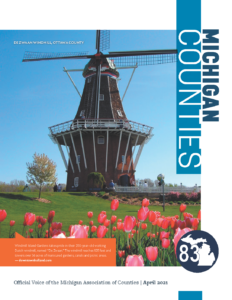Legislature attaches strings to FY22 revenue sharing funds
 As the Legislature advanced budget bills this week, differences between the House and Senate are injecting some uncertainty into county revenue sharing for fiscal 2022, which starts Oct. 1.
As the Legislature advanced budget bills this week, differences between the House and Senate are injecting some uncertainty into county revenue sharing for fiscal 2022, which starts Oct. 1.
The Senate advanced a 2 percent increase, which is in line with what Gov. Gretchen Whitmer proposed earlier this year, but with a requirement that “any county with a retirement benefit system that was in underfunded status must dedicate any County Revenue Sharing increase to that system.”
The House, however, is recommending only a 1 percent increase, and ties the boost to a requirement “to maintain public safety expenditures at an amount not less than FY 2020-21 amount to qualify for a payment.” The House also has an underfunded retirement system restriction.
Any amount below a 2 percent increase would be a disappointment for Michigan counties, especially in light of the billions of dollars now available to the state. And MAC will strongly oppose any bid by legislators to attach strings to revenue sharing funds, which are, by definition, supposed to be for the general use of counties.
MAC urges members to call their legislators (follow links below to phone lists) and share their opposition to efforts to restrict revenue sharing dollars.
Budget bills were passed out of appropriations subcommittees in each chamber largely on party-line votes. In a twist, under House proposals, funding for many state agencies would be done on a quarterly basis, rather than the typical full-year budget. The House Appropriations chair, Rep. Thomas Albert (R-Ionia) explained, “This change ensures more accountability, efficiency and transparency by building it right into the system four times a year through legislative review.”
Other budget items advanced with significant effects for counties include:
- $14.8 million for county jail reimbursement program (House and Senate versions)
- $5 million for COVID-19 reimbursement for county jails for housing prisoners (House)
- $51.4 million for essential local public health (House); Senate version is $56.4 million
- $36 million allocation of federal state opioid response grants (House and Senate)
- $265 million for the Child Care Fund (House); Senate version is $229 million
- $3.5 million for county indirect cost allotments (House and Senate)
- $9.1 million for the Raise the Age Fund for implementation and non-eligible CCF items (House); Senate version is $14 million
- $26.5 million to fund a certified community behavioral health clinics demonstration program (House and Senate)
- $4 million for county veteran service fund grants (House and Senate)
- $12.9 million for secondary road patrol program (House and Senate)
- $10.1 million to phase out local CMH drawdown on Medicaid (Senate)
If you have questions about the FY22 budget, please email them to Hannah Sweeney at sweeney@micounties.org.
Legislative Conference starts next week; registration closes April 26
 The first plenary session of the 2021 Michigan Counties Legislative Conference is now less than a week away. County leaders, however, still have time to register for the virtual event April 28-29, as registration remains open until 5 p.m. on April 26.
The first plenary session of the 2021 Michigan Counties Legislative Conference is now less than a week away. County leaders, however, still have time to register for the virtual event April 28-29, as registration remains open until 5 p.m. on April 26.
The conference will feature:
- More than a dozen workshops for members of MAC and the Michigan County Medical Care Facilities Council (MCMCFC)
- Three plenary sessions that will feature a Legislative Roundtable, presentations by the National Association of Counties and the first “graduation ceremony” for MAC’s County Commissioner Academy
Please make note of a late change to the program:
The workshop on Michigan planning organizations, originally scheduled for Thursday morning, has been canceled. Those who had planned to attend that event will be redistributed into the other two workshops during the Thursday morning pod. MAC apologies for any inconvenience
MAC and MCMCFC appreciate the support of conference sponsors.
What’s the latest on federal funds?
 While specific spending guidance has not been released, the first batch of funds from the $65 billion in direct federal investment in counties is expected to arrive in county accounts “around May 10th or so,” said NACo Executive Director Matt Chase during a membership call on Thursday afternoon.
While specific spending guidance has not been released, the first batch of funds from the $65 billion in direct federal investment in counties is expected to arrive in county accounts “around May 10th or so,” said NACo Executive Director Matt Chase during a membership call on Thursday afternoon.
In other key points during the call, Chase noted:
- “We still aren’t 100 percent sure when the first round of (spending) guidance will be out … though we are thinking late April to early May.”
- If your county has multiple DUNS numbers, figure out which one is for your general purpose fund. And note your preferred account. If you have multiple accounts, it is up to you (the county) to advise Treasury on which is the correct one for the deposit.
- Make sure your SAM registration is active.
The Michigan Department of Treasury issued the following advisory this week:
“Under the American Rescue Plan Act of 2021 (ARPA), the U.S. Department of Treasury has established three classifications for local governments – metropolitan cities, counties, and non-entitlement communities. Metropolitan cities are defined by the Housing Community Development Act of 1974. Non-entitlement communities are generally local governments other than counties and metropolitan cities.
“Metropolitan cities and counties will receive their federal ARPA payments directly from the U.S. Department of Treasury, while non-entitlement communities will receive their payments through the state of Michigan.
“On April 15, 2021, the U.S. Department of Treasury announced pre-award requirements for metropolitan cities and counties. While this guidance focuses on metropolitan cities and counties, non-entitlement communities are expected to provide the same information, which includes a DUNS number and a SAM registration.
“Many of Michigan’s local governments have already set up this information for the state-level CARES Act programs administered last year, which included the Coronavirus Relief Local Government Grants Program (CRLGG), First Responder Hazard Pay Premiums Program (FRHPPP), and Public Safety and Public Health Payroll Reimbursement Program (PSPHPR).
“Local governments must renew their SAM registration annually to maintain an ‘active status,’ which designates an entity as eligible to receive federal financial assistance. Additional information on this topic is available on the U.S. Department of Treasury’s Coronavirus State and Local Fiscal Recovery Fund webpage.
The Michigan Treasury Department is encouraging local governments to review tips about preparing for the use of ARPA dollars by viewing Treasury’s “Planning for the Use of the American Rescue Plan Act” memo. This information will assist local governments as they prepare to use this funding most effectively.
Materials Management package passes House
 An eight-bill, bipartisan package rewriting the section of the Natural Resources and Environmental Protection Act that governs solid waste planning was passed by the House this week. A significant amount of time, dedication and work has gone into this package by all of the stakeholders and the product that they voted out was based on an overall consensus. Not everyone is happy with the entire package, and there are a few issues that still need to be ironed out but the package is a modernization of the statute which reflects an emphasis on materials management, sustainable disposal of waste and additional environmental protections.
An eight-bill, bipartisan package rewriting the section of the Natural Resources and Environmental Protection Act that governs solid waste planning was passed by the House this week. A significant amount of time, dedication and work has gone into this package by all of the stakeholders and the product that they voted out was based on an overall consensus. Not everyone is happy with the entire package, and there are a few issues that still need to be ironed out but the package is a modernization of the statute which reflects an emphasis on materials management, sustainable disposal of waste and additional environmental protections.
MAC supports House Bills 4454-61 in concept, with just a few, but significant reservations.
The reservations MAC has is not so much about the goals, the protections or the regulations, but with the challenges the planning agencies will face with regard to the process for writing and adopting the materials management plan. The three-year process includes a significant level of outreach, communication, coordination, research, negotiation, scientific expertise, approvals, amendments and eventually implementation. It is an inclusive, necessary process but one that will require resources that will likely exceed the allocation proposed in the legislation. We will know the full extent of the costs or challenges until the process gets under way.
Nonetheless MAC would be remiss if we did not express concern over the costly and time-consuming process necessary to achieve plan development let alone the additional expenses likely to be incurred in the achievement of the recycling goals set forth in the bills. Although it is the right thing to do for our planet, our future generations and our communities, the financial return on investment is, in many cases, a deterrent.
For additional details on this package, click here.
MAC still needs your voice on 4-year terms legislation
 MAC continues to wait on word from the Senate Local Government Committee about the first hearings for bipartisan legislation to enact four-year terms for county commissioners.
MAC continues to wait on word from the Senate Local Government Committee about the first hearings for bipartisan legislation to enact four-year terms for county commissioners.
Senate Bill 242, by Sen. Ed McBroom (R-Dickinson), and SB 245, by Sen. Jeremy Moss (D-Oakland) would bring four-year terms to Michigan in the 2024 presidential election cycle. Passage of these bills would end Michigan’s status as one of just five states with two-year terms on all commissioners.
To date, 48 commissioners have utilized the email system; up from last week, but still not nearly enough to get the Senate’s full attention. Please add your voice to this effort today by clicking here.
MAC also requests that counties adopt official resolutions of support for the legislation. To download a template for this purpose, click here.
As of Friday morning, MAC was aware of 11 counties with 4-year term resolutions in 2021: Allegan, Bay, Cheboygan, Clinton, Emmet, Genesee, Houghton, Marquette, Newaygo, Ontonagon and Wexford. (with map)
When your county passes such a resolution, please send a copy to Hannah Sweeney at sweeney@micounties.org.
Check out past podcast episodes on YouTube
 Every video episode of MAC’s Podcast 83 is now available on MAC’s YouTube channel, including the April 19 live session in which MAC’s Stephan Currie, Deena Bosworth and Meghann Keit discussed state budget news for fiscal 2022.
Every video episode of MAC’s Podcast 83 is now available on MAC’s YouTube channel, including the April 19 live session in which MAC’s Stephan Currie, Deena Bosworth and Meghann Keit discussed state budget news for fiscal 2022.
While you are catching up on your podcast viewing, please note the team is taking a hiatus for April 26 to prepare for the Michigan Counties Legislative Conference April 28-29.
The next live episode of Podcast 83 is expected on Monday, May 3 at 3 p.m. Check next Friday’s Legislative Update email for registration information.
Funding for MIDC grants advances in budget process
 Funding for the Michigan Indigent Defense Commission (MIDC) grants to counties moved from House and Senate subcommittees this week with $148.9 million recommended, a figure in line with the governor’s proposal.
Funding for the Michigan Indigent Defense Commission (MIDC) grants to counties moved from House and Senate subcommittees this week with $148.9 million recommended, a figure in line with the governor’s proposal.
However, the House plan had an ironic spin on the funds, as they cover the new Standard 5, which requires independence from the judiciary, and moves the entirety of the MIDC budget under the judicial branch. Under current state law (MIDC Act), the commission is under the Department of Licensing and Regulatory Affairs (LARA). In the original version of the MIDC Act, passed in 2013, the commission was housed within the judicial branch, but that changed in 2016 after the Michigan Supreme Court noted the uncertain constitutionality of the 2013 act, all of which involve the potential for interference with constitutional provisions pertaining to the separation of powers between branches of government.
State law would have to be changed to implement this budget recommendation this year, and Chair Jeff Yaroch (R-Macomb) of the LARA Appropriations Subcommittee explained to committee members that the debate would take place on the location of the money through the process of changing the law. Chair Sarah Lightner (R-Jackson) of the Judiciary Appropriations Subcommittee said she felt it was a better fit under this budget and Chair Yaroch concurred.
In other MIDC news, the commission met this week and approved a sticking point in the Wayne County FY 21 proposal. After going through the statutory mediation process over dispute of funds for the counties new jail complex to comply with Standard 2 which requires private and confidential meeting space for defense counsel and their client. The commission approved the mediator’s recommendation to a fund $2.3 million of the requested $4.9 million.
The commission also heard from the Lansing research firm of Public Sector Consultants on its local share interim report, which is required under statute and due by October 2021. The consultants will be convening focus groups and developing further recommendations and updates for a final report to the commission in upcoming months.
For more information on this issue, contact Meghann Keit-Corrion at keit@micounties.org.
Governor forms new jails panel; Alpena’s Peterson appointed
 A new jail reform panel, which will build on work of a 2019 highly successful county-state joint task force, was formed this week by Gov. Gretchen Whitmer.
A new jail reform panel, which will build on work of a 2019 highly successful county-state joint task force, was formed this week by Gov. Gretchen Whitmer.
“The Jail Reform Advisory Council will play a critical role in implementing long overdue reforms to our justice system,” Whitmer said in a statement. “Michigan will continue to lead the way as we take tangible steps to reform our justice system, and I know that the bipartisan work of this council will make our communities and state safer, save taxpayer dollars and help us achieve the goals laid out by the Task Force on Jail and Pretrial Incarceration.”
Among appointees to the panel are Bill Peterson, an Alpena County commissioner and owner and operator of Twin Acres 19th Hole restaurant. He is appointed to represent a member of a board of county commissioners for a term expiring March 31, 2023.
Peterson was one of two MAC-recommended appointees to the 2019 panel that drafted a series of recommendations that were codified during the last legislative session.
Other county officials on the new panel are Washtenaw County Sheriff Jerry Clayton, Oakland County Community Corrections Division Manager Barbara Hankey and Muskegon County Prosecutor D.J. Hilson.
MAC resuming print production of Michigan Counties magazine
Michigan Counties April 2021  After a decade-long hiatus, print copies of MAC’s bimonthly magazine, Michigan Counties, will soon be arriving in county mailboxes around Michigan.
After a decade-long hiatus, print copies of MAC’s bimonthly magazine, Michigan Counties, will soon be arriving in county mailboxes around Michigan.
For many years, our bimonthly magazine was printed and mailed to county leaders across our state. About a decade ago, we halted printing as one of many cost-saving measures taken at MAC to allow us to keep member dues frozen during the depths of the Great Recession.
“Thanks to our continuing efforts to diversify our revenue streams, and the improving nature of Michigan’s economy, we made the decision this year to return Michigan Counties to print,” announced Stephan Currie, MAC executive director.
Complimentary copies are now being mailed to the commissioners, administrators and board offices of all MAC member counties. Our state legislators also will receive copies, so keep an eye out for it the next time you visit your representative and senator in their Lansing offices.
A digital version of the magazine, released at the end of February, April, June, August, October and December each year, will still be available on the MAC website.
State announces $1M in grants for broadband expansion
 The state has released another $1 million in grant funding to extend broadband service in Michigan, with the newest funded projects slated for areas in the following counties: Berrien, Branch, Calhoun, Genesee, Kalamazoo, Shiawassee and St. Joseph.
The state has released another $1 million in grant funding to extend broadband service in Michigan, with the newest funded projects slated for areas in the following counties: Berrien, Branch, Calhoun, Genesee, Kalamazoo, Shiawassee and St. Joseph.
“This builds off the $11.9 million announced in November 2020,” said a Department of Technology, Management and Budget (DTMB) statement, “and will provide service to an additional 1,300 households, businesses and community anchor institutions (CAI) in Michigan. All projects have committed to closing the internet access divide and provide digital literacy training materials to residents and businesses in their proposed service area, and work with local CAIs and foundations to host events to promote e-learning, job, and workforce training.”
A third round of projects are currently under public review with DTMB accepting comment or objections concerning each project through May 5, 2021. Public Act 166 of 2020 requires that DMTB “receive a sworn statement from an internet service provider” to amend an initial grant award in areas “where construction of a network to provide broadband service is under way, and construction is scheduled to be completed within 1 year after the date of application,” as well areas that have received funding from the Federal Communication Commission (FCC) or the United States Department of Agriculture (USDA) “specifically for the expansion of broadband services. Review the CMIC 2.0 initial grant awards here.
For additional information about the CMIC Broadband Grant, visit www.michigan.gov/CMICGrant.
To learn more about the Connecting Michigan Task Force, visit https://www.michiganbusiness.org/broadband/.
 Staff picks
Staff picks
- Michigan offers new model for jail reform (Pew Trusts)
- Alternatives to juvenile justice probation growing in many states, report finds (Route Fifty)
- Drop off unwanted prescription drugs at April 24 (Oakland County) ‘Take Back Day’ (Oakland Press)
- Can rescue funds give America the broadband it really wants? (Governing)
